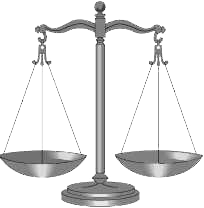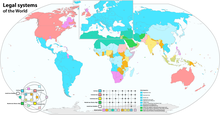Capital punishment, also known as the death penalty and formerly called judicial homicide, is the state-sanctioned practice of killing a person as a punishment for a crime, usually following an authorised, rule-governed process to conclude that the person is responsible for violating norms that warrant said punishment. The sentence ordering that an offender be punished in such a manner is known as a death sentence, and the act of carrying out the sentence is known as an execution. A prisoner who has been sentenced to death and awaits execution is condemned and is commonly referred to as being "on death row". Etymologically, the term capital refers to execution by beheading, but executions are carried out by many methods, including hanging, shooting, lethal injection, stoning, electrocution, and gassing.

Criminal justice is the delivery of justice to those who have been accused of committing crimes. The criminal justice system is a series of government agencies and institutions. Goals include the rehabilitation of offenders, preventing other crimes, and moral support for victims. The primary institutions of the criminal justice system are the police, prosecution and defense lawyers, the courts and the prisons system.

In the United States, capital punishment is a legal penalty throughout the country at the federal level, in 27 states, and in American Samoa. It is also a legal penalty for some military offenses. Capital punishment has been abolished in 23 states and in the federal capital, Washington, D.C. It is usually applied for only the most serious crimes, such as aggravated murder. Although it is a legal penalty in 27 states, 20 states have the ability to execute death sentences, with the other seven, as well as the federal government, being subject to different types of moratoriums. The existence of capital punishment in the United States can be traced to early colonial Virginia. Along with Japan, Singapore, and Taiwan, the United States is one of four advanced democracies and the only Western nation that applies the death penalty regularly. It is one of 54 countries worldwide applying it, and was the first to develop lethal injection as a method of execution, which has since been adopted by five other countries. The Philippines has since abolished executions, and Guatemala has done so for civil offenses, leaving the United States as one of four countries to still use this method. It is common practice for the condemned to be administered sedatives prior to execution, regardless of the method used.

Prison reform is the attempt to improve conditions inside prisons, improve the effectiveness of a penal system, or implement alternatives to incarceration. It also focuses on ensuring the reinstatement of those whose lives are impacted by crimes.

Capital punishment is a legal penalty in China. It is commonly applied for murder and drug trafficking, and is a legal penalty for other offenses. Executions are carried out by lethal injection or by shooting. In a survey conducted by the New York Times in 2014, it was found the death penalty retained widespread support in Chinese society.

Capital punishment in India is a legal penalty for some crimes under the country's main substantive penal legislation, the Indian Penal Code, as well as other laws. Executions are carried out by hanging as the primary method of execution as given under Section 354(5) of the Criminal Code of Procedure, 1973 is "Hanging by the neck until dead", and is imposed only in the 'rarest of cases'.
Hudud is an Arabic word meaning "borders, boundaries, limits". In the religion of Islam, it refers to punishments that under Islamic law (sharīʿah) are mandated and fixed by God as per Islam. These punishments were applied in pre-modern Islam, and their use in some modern states has been a source of controversy.
Throughout the history of criminal justice, evolving forms of punishment, added rights for offenders and victims, and policing reforms have reflected changing customs, political ideals, and economic conditions.
Community sentence or alternative sentencing or non-custodial sentence is a collective name in criminal justice for all the different ways in which courts can punish a defendant who has been convicted of committing an offense, other than through a custodial sentence or capital punishment (death).
The major world religions have taken varied positions on the morality of capital punishment and, as such, they have historically impacted the way in which governments handle such punishment practices. Although the viewpoints of some religions have changed over time, their influence on capital punishment generally depends on the existence of a religious moral code and how closely religion influences the government. Religious moral codes are often based on a body of teachings, such as the Old Testament or the Qur'an.

Deterrence in relation to criminal offending is the idea or theory that the threat of punishment will deter people from committing crime and reduce the probability and/or level of offending in society. It is one of five objectives that punishment is thought to achieve; the other four objectives are denunciation, incapacitation, retribution and rehabilitation.

Capital punishment is a legal penalty in Japan. In practice, it is applied only for aggravated murder, but the current Penal Code and several laws list 14 capital crimes, including conspiracy to commit civil war; conspiracy with a foreign power to provoke war against Japan; murder; obstruction of the operation of railroads, ships, or airplanes resulting in the death of the victim; poisoning of the water supply resulting in the death of the victim; intentional flooding; use of a bomb; and arson of a dwelling. Executions are carried out by long drop hanging, and take place at one of the seven execution chambers located in major cities across the country.
Capital punishment is a legal penalty in Pakistan. Although there have been numerous amendments to the Constitution, there is yet to be a provision prohibiting the death penalty as a punitive remedy.
The debate over capital punishment in the United States existed as early as the colonial period. As of April 2022, it remains a legal penalty within 28 states, the federal government, and military criminal justice systems. The states of Colorado, Delaware, Illinois, Maryland, New Hampshire, Virginia, and Washington abolished the death penalty within the last decade alone.
Crime in Utah manifests in various forms, including but not limited to violent crimes, property crimes, drug-related offenses, and white-collar crimes. While some regions in Utah report lower crime rates relative to national averages, certain urban areas experience elevated levels of specific types of crime. The state grapples with a range of law enforcement challenges that reflect both its urban and rural landscapes, as well as its unique sociocultural factors.
Life imprisonment is one of the five principal punishments stipulated in Article 33 of the Criminal Law of the People's Republic of China. In the Criminal Law, there are 87 penalties for life imprisonment.

Capital punishment in Islam is traditionally regulated by the Islamic law (sharīʿa), which derived from the Quran, ḥadīth literature, and sunnah. Crimes according to the sharīʿa law which could result in capital punishment include apostasy from Islam, murder, rape, adultery, homosexuality, etc. Death penalty is in use in many Muslim-majority countries, where it is utilised as sharīʿa-prescribed punishment for crimes such as apostasy from Islam, adultery, witchcraft, homosexuality, murder, rape, and publishing pornography.

Capital punishment as a criminal punishment for homosexuality has been implemented by a number of countries in their history. It currently remains a legal punishment in several countries and regions, most of which have sharia–based criminal laws except for Uganda.

The Islamic Republic of Iran was founded after the 1979 overthrow of the Pahlavi dynasty by the Islamic Revolution, and its legal code is based on Islamic law or sharia, although many aspects of civil law have been retained, and it is integrated into a civil law legal system. According to the constitution of the Islamic Republic, the judiciary in Iran "is an independent power". The entire legal system—"from the Supreme Court to regional courts, all the way down to local and revolutionary courts"—is under the purview of the Ministry of Justice, but in addition to a Minister of Justice and head of the Supreme Court, there is also a separate appointed Head of the Judiciary. Parliamentary bills pertaining to the constitution are vetted by the Council of Guardians.
Capital punishment in Malawi is a legal punishment for certain crimes. The country abolished the death penalty by a Malawian Supreme Court ruling in 2021, but it was soon reinstated. However, the country is currently under a death penalty moratorium, which has been in place since the latest execution in 1992.











